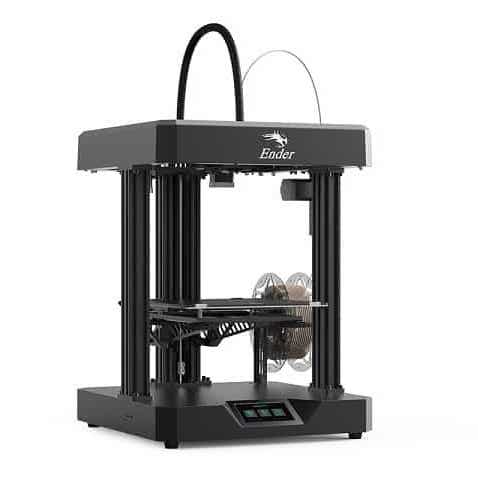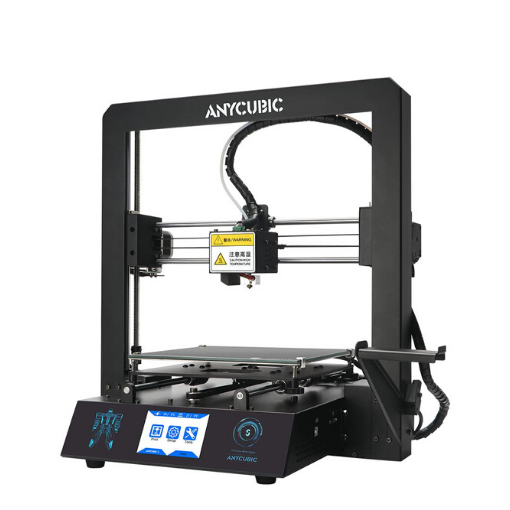Compare Ender 7 vs Mega S
Comparison between the best 3D printers
Choose the best 3D printer at the best price. The cheapest 3D printers are here.
Buy a 3D printer here with 3D Fila.
 |
 |
|
| Model | Ender 7[BUY Ender 7] |
Mega S |
| Printing Material | Filament | Filament |
| Buy Filament for Creality 3D Ender 7 | Buy Filament forAnycubic Mega S | |
| Estimated price | $429,00 | $149,00 |
| Manufacturer | Creality 3D | Anycubic |
| Release Year | 2021 | 2019 |
| Print Volume [mm] | 250x250x300 | 210x210x205 |
| Printer Size [mm] | 430x460x570 | 405x410x452 |
| Weight [kg] | 17,2 | 14,5 |
| Power Loss Recovery | YES | YES |
| Enclosed printer | NO | NO |
| Bed Leveling | Manual | Manual |
| Filament End Sensor | YES | YES |
| Bed type | Heated | Heated |
| Power supply system | Bowden | Bowden |
| Standard nozzle | 0,4 | 0,4 |
| Maximum Nozzle Temperature [°C] | 260 | 260 |
| Maximum Bed Temperature [°C] | 100 | 110 |
| Maximum printing speed [mm/s] | 250 | 100 |
| Filament holder | YES | YES |
| Camera for supervision | NO | NO |
| Recommended filaments | PLA, PETG, Tritan, Flex, ABS | PLA, TPU, ABS, PETG |
| Recommended slicers | Cura, Simplify, Slic3r, IdeaMaker | Cura, Simplify, Slic3r |
| Maximum Resolution [mm] | 0,1 | 0,1 |
| Processor | Creality CR-FDM V.2.4.S1_V101 32bits | 8 bits |
| Display | Display touchscreen 4,3'' | Touchscreen TFT 2,8'' |
| Power Supply | 110/220V / 350W | 12V / 300W |
| Connectivity | SD / USB | SD / USB |
| Operating systems | Windows, Mac, Linux | Windows, Mac, Linux |
| Date of registration in the system | 2022-11-04 | 2021-04-15 |
| Release date | 2021 | 2019 |
| Extra features | Crealitys Ender 7 printer offers remarkable print speeds, utilizing CoreXY kinematics for precise and fast movement. With a 250x250x300mm build area, dual direct extruder, and custom hotend, the Ender 7 is capable of printing at high speeds, although quality may suffer on smaller prints. Assembly is relatively straightforward, but the machine is noisy and can get hot. Its true speed potential is most noticeable on larger prints, where it outperforms its competitors. | The Anycubic Mega S offers a printing platform with excellent adhesion, easy removal after cooling. It has a filament sensor for a better experience with flexible materials and a multilingual and intuitive color touchscreen. Assembly is quick, requiring only 8 screws and 3 connections. It has a large build volume (210 x 210 x 205 mm), high positioning accuracy and supports a variety of materials, including TPU, PLA, ABS and wood. It stands out for its solid metal structure, superior stability, high-quality printing with layer resolution of up to 50 microns, Ultrabase for easy adhesion and removal of parts, resumption of printing after power outage, high-quality extruder for flexible filaments, suspended filament support and stable structure that reduces shaking, improving printing quality. |
| Support for multiple colors and materials (AMS and CFS) | NO | NO |
Notes * |
||
| Cost-benefit | 7 / 10 | 7 / 10 |
| Hardware | 2 / 10 | 2 / 10 |
| Tela | . | . |
| Print volume | 4 / 10 | 3 / 10 |
| Performance | 2 / 10 | 1 / 10 |
| [BUY Ender 7] |
Conclusion |
| In conclusion, when comparing the Creality Ender 7 and the Anycubic Mega S, there are several key factors to consider beyond just price. The Ender 7, priced higher, offers superior print speeds and a larger build volume, making it ideal for larger projects and those seeking faster production times. Its CoreXY kinematics result in precision and speed, although it may produce some noise and heat during operation. On the other hand, the Anycubic Mega S, with its lower price point, provides excellent print quality, versatility with various materials, and ease of assembly, making it user-friendly for beginners. Its Ultrabase bed ensures strong adhesion during printing, which is particularly beneficial for flexible materials. While both printers feature power loss recovery and similar connectivity options, the Ender 7's advanced performance may be more appealing to experienced users or those focused on high-speed production, whereas the Mega S offers a solid value for those prioritizing reliability and ease of use. Ultimately, the choice between these two models should be guided by the user's specific needs, such as budget, print volume requirements, and desired speed, as both offer strong capabilities in their respective categories. |

